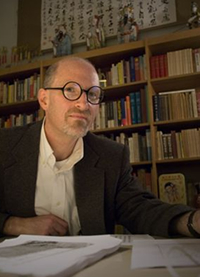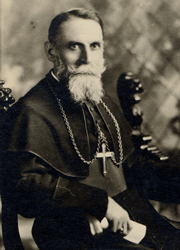History Professor Researches Vatican Secret Archives and Pope’s Private Library

Access to the Vatican Secret Archives is a privilege granted to only a limited number of researchers each year. Dr. Anthony Clark, assistant professor of Chinese history at The University of Alabama, had access to the Secret Archives and the Pope’s private library in Vatican City last summer to research 14th through 17th century letters between European and Chinese monarchs.
“This is an extremely rare opportunity,” says Clark. “I began requesting access to the Vatican’s Secret Archives about two years ago, and after a review by the Cardinal Prefect I was granted permission to view the guarded documents.”
The research was for Clark’s upcoming book entitled “Martyrs of the Middle Kingdom: The Catholic Saints of China,” a historical study of the recently canonized missionaries and Chinese converts who were tortured and killed during China’s Boxer Uprising in the late 1800s. During that time, Chinese troops slaughtered foreigners and then destroyed or suppressed the records. However, a few surviving priests smuggled some records.
“One thing I found was a rare Catholic book for priests, which they used to say the mass in native Chinese,” says Clark, a faculty member in UA’s College of Arts and Sciences. “This is significant since most people think that before the 1960s, the mass was only said in Latin.”

“I also discovered several unpublished photographs of missionaries in China during the late 19th Century, and some photos that were taken by them of public executions and punishments. This will add a lot to our knowledge of the Chinese justice system.”
Scholarly access to the Secret Archives was granted in 2003. About 1,500 scholars from 60 countries are granted access each year. Researchers must endure a strict and tedious application process. The libraries closed in July, right after Clark’s visit, for a three-year renovation. Most of the manuscripts are in fragile condition and strict guidelines must be followed to protect them from further wear.
Clark says he had to copy almost everything by hand with a pencil. “In fact, I copied entire books in Chinese while working in the archives, many of which hadn’t been consulted since the 17th century.” He did receive, with approval of the Cardinal Prefect, copies of some church records.
Given that he was granted access to both the archives – the Papal Library and the Secret Archives – Clark was able to view more of the grounds. “One of the most exciting things I saw was a wall-sized map of the world produced by Jesuits in China during the 17th century,” Clark adds. “It was incredible!”
Further Reading